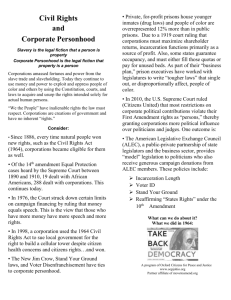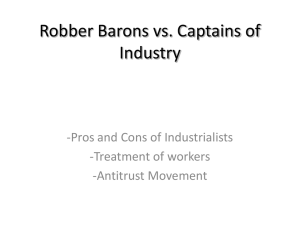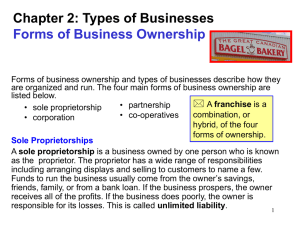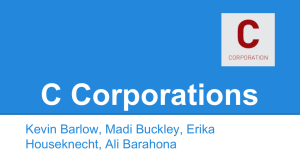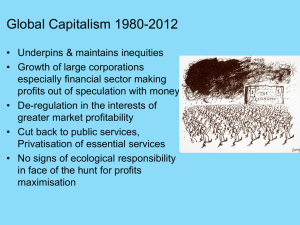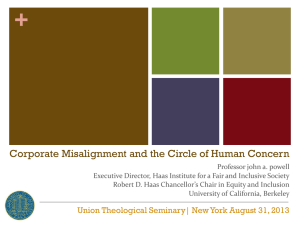Corporate Personhood – the ethical issues
advertisement
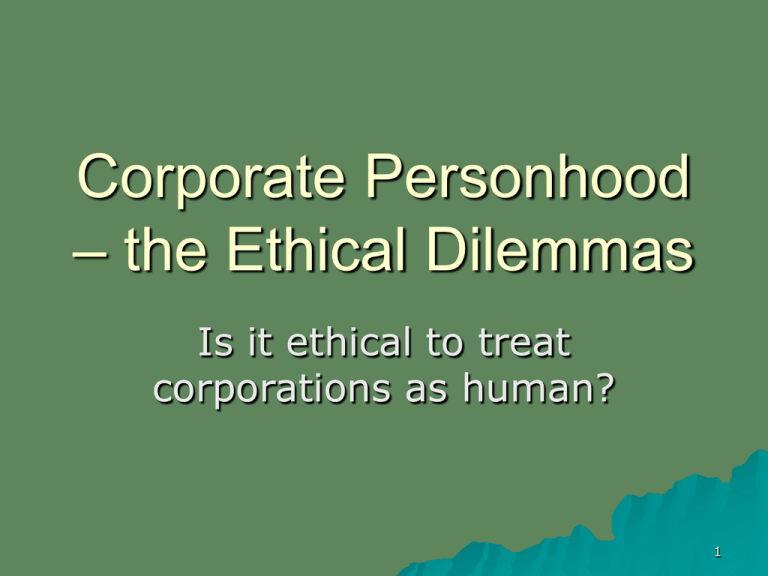
Corporate Personhood – the Ethical Dilemmas Is it ethical to treat corporations as human? 1 What Is a Corporation? an association of individuals, created by law or under authority of law, having a continuous existence independent of the existences of its members, and powers and liabilities distinct from those of its members. A legal vehicle for accumulating wealth while minimizing risks and responsibilities 2 What is Corporate Personhood? The granting under law of the rights of a human being to a corporation “Slavery is the legal fiction that a person is property. Corporate Personhood is the legal fiction that property is a person”. -- Jan Edwards and Molly Morgan, Women's International League for Peace and Freedom (WILPF) 3 Corporations Now Have These Rights Free speech, including freedom to influence legislation and donate to candidates Buy and sell property and other companies Sue individuals or other corporations in court Protection from searches, as if their belongings were private Fifth Amendment protections against double jeopardy and self-incrimination The benefit of due process and antidiscrimination laws 4 Something New in Human History Traditional English, Dutch, French, and Spanish law didn’t say that corporations were people Founders never intended corporations to be treated as human For America’s first hundred years, courts (including Supreme Court) repeatedly said corporations did not have same rights as humans Only since 1886 have the Bill of Rights and equal protection amendment been applied to corporations Never voted by the public, never enacted by law, never stated by a decision after an argument before the Supreme Court 5 Corporations in Early American History Boston Tea Party: the first anticorporate protest? Founding Fathers wanted to limit corporate power Early corporations were tightly controlled 6 The Genesis of Corporate Personhood Railroads rise to power Post-Civil War attempts to expand corporate power 1886 - Santa Clara County vs. Southern Pacific Railroad 7 Case Law Builds on Santa Clara 1889 - Minneapolis & St. Louis Railroad v. Beckwith: Supreme Court rules a corporation is a “person” for both due process and equal protection 1905 – Lochner v. New York: Invalidation of government regulation of the corporation. Over 200 cases follow that invalidate regulations 1906 – Hale v. Henkel: Corporations get 4th Amendment “search and seizure” protection 1919 – Dodge v. Ford Motor Co.: “stockholder primacy” is established 8 Modern Enhancements to Corporate Rights 1967 – See v. City of Seattle: Supreme Court grants corporations 4th amendment protection from random inspection by fire department 1970 – Ross v. Bernhard: Corporations get right to jury trial 1976 - Buckley v. Valeo: Supreme Court rules that political money is equivalent to speech 1976 – Virginia Board of Pharmacy v. Virginia Consumer Council: Supreme Court rules that advertising is free speech 1994 – ratification of GATT: global trade agreement 9 So What’s the Problem? No Concern for Human Welfare Designed by law to care only for their stockholders Lack of social ties and anonymity Example: Unsafe automobiles 10 So What’s the Problem? Superhuman, Not Human Can live indefinitely Can cut off parts of themselves, split, sprout new parts, be in multiple locations at the same time Have enormous financial resources Can litigate repeatedly until they win 11 So What’s the Problem? Concentration of Economic Power The Fortune 1,000 companies control 70% of the American economy Two hundred corporations conduct almost 1/3 of the entire planet’s economic activity (but employ less than 0.25% of the world’s workforce) Over half of the largest economies in the world are corporations, not countries 12 So What’s the Problem? Harming Democracy GATT created a global trade dictatorship Corporations stifle free speech Corporations influence governments inappropriately Corporate ownership of media stifles the public’s knowledge about issues choices Corporations enable despotic regimes Corporations influence regulations 13 So What’s the Problem? Harming the Environment Extinctions and destruction of rainforest Factory farming and agribusiness takeover of family farms GMO’s Pollution and health impacts 14 Solutions? Municipal ordinances that restrict corporations State laws that restrict corporations Constitutional amendment 15 Resources www.reclaimdemocracy.org www.poclad.org (Program on Corporations, Law and Democracy) Unequal Protection, by Thom Hartmann The Corporation (DVD) A Retrospect of the Boston Tea Party, Hewes, George R. T. http://www.archive.org/stream/retrospect ofbost00hawk 16
